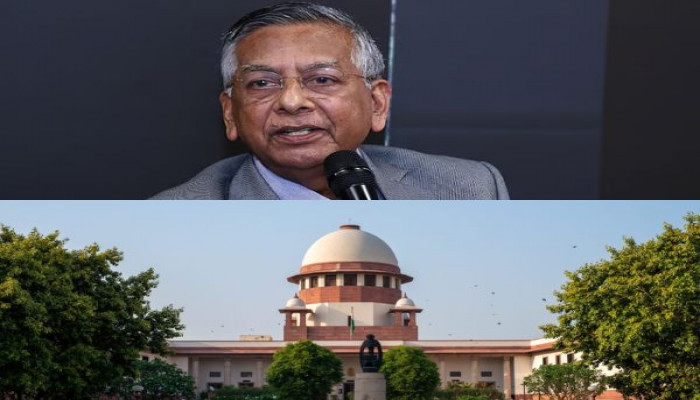‘Can SC take a pen and paper and rewrite the constitution’: Attorney General on timelines for Governors and President
- In Reports
- 06:30 PM, Aug 20, 2025
- Myind Staff
Attorney General R Venkataramani on Tuesday questioned the Supreme Court's order to impose a timeline for State Governors and the President to sign bills passed by the legislatures, saying that the court cannot assume executive powers and attempt to "rewrite the constitution".
The Attorney General presented his case before a five-judge Constitution bench led by Chief Justice B R Gavai during the hearing of the presidential reference.
The Attorney General, the country’s top law officer, said, "You (SC) bind the hands of the President. The President will exercise the highest consideration whether to assent or not. The court ventured into a regulation-making power here. The President and Governor are practically robbed of their application of mind. Can the court go to the extent where it says, let me take a pen and paper and rewrite the constitution."
Venkataramani requested the bench to amend its April 8 order.
On April 8, a two-judge bench of the Supreme Court comprising Justices J B Pardiwala and R Mahadevan, while hearing State of Tamil Nadu versus Governor of Tamil Nadu, ruled that a Governor has to act within three months when refusing assent or reserving a Bill, and one month in the event of a re-enactment of a Bill. The bench also ruled that the President must decide on the bills reserved for her consideration by the Governor within three months of receiving such a reference.
During Tuesday’s hearing, the court asked the Attorney General what would be the "Constitutionally permissible recourse" if a Governor keeps Bills pending for years.
The Attorney General replied that even in such an unfavourable situation, the court cannot take over the functions of the Governor and give assent to the Bills.
As the hearing remained undecided on Tuesday, it will continue on Wednesday.
When the court pointed out that Bills dating back to 2020 were still pending in Tamil Nadu, the Attorney General admitted this but said that reasons had been given for the delay, which the court had rejected.
"There are numerous reasons why the Governor likely withheld his assent. We are not going into those reasons," he said.
Venkataramani clarified that he was "speaking of the state of law" and not commenting on why the Governor had made his decisions.
He also questioned whether the court can invoke Article 142 to declare deemed assent.
Challenging the April 8 ruling, President Murmu had approached the Supreme Court on May 13.
Using her powers under the rarely invoked Article 143 (1), President Murmu went to the court and said that in the given situation, 14 questions of law had arisen, and since they were of such importance to the public, it was necessary to seek the opinion of the Supreme Court.
Senior Advocate K K Venugopal, appearing for Kerala, argued that the reference was not maintainable. He said, "The President is under the obligation of the aid and advice of the Council of Ministers by virtue of Article 74, as he is really communicating the Union's stand. The Union cannot sidestep the mechanisms of review or curative petitions established and instead resort to Article 143 to revisit matters already determined."
Senior Advocate Abhishek Manu Singhvi, representing Tamil Nadu, made similar arguments and said that the ruling of the Division Bench had, in effect, rewritten Article 200 by taking away the discretion earlier available to the Governor. He said, "Allowing the reference would only compound this institutional irregularity." Singhvi added that the court was being asked to change the contents and substance of a judgment between two different parties, which would undermine institutional integrity.
After hearing these objections from Kerala and Tamil Nadu on the maintainability of the reference, the court said that it would only be giving its view on the law and not on the Tamil Nadu case itself.
Some of the 14 important questions raised by President Murmu were:
What are the constitutional options available before a Governor when a Bill is presented under Article 200 of the Constitution of India?
Is the Governor bound by the aid and advice of the Council of Ministers while exercising all options available under Article 200 of the Constitution of India?
Is the exercise of constitutional discretion by the Governor under Article 200 of the Constitution of India subject to judicial review?
Is Article 361 of the Constitution of India a complete bar to judicial review in relation to the acts of a Governor under Article 200 of the Constitution of India?
In the absence of a constitutionally prescribed time limit and procedure, can timelines be imposed and the manner of exercise prescribed by judicial orders for the Governor’s powers under Article 200 of the Constitution of India?







Comments